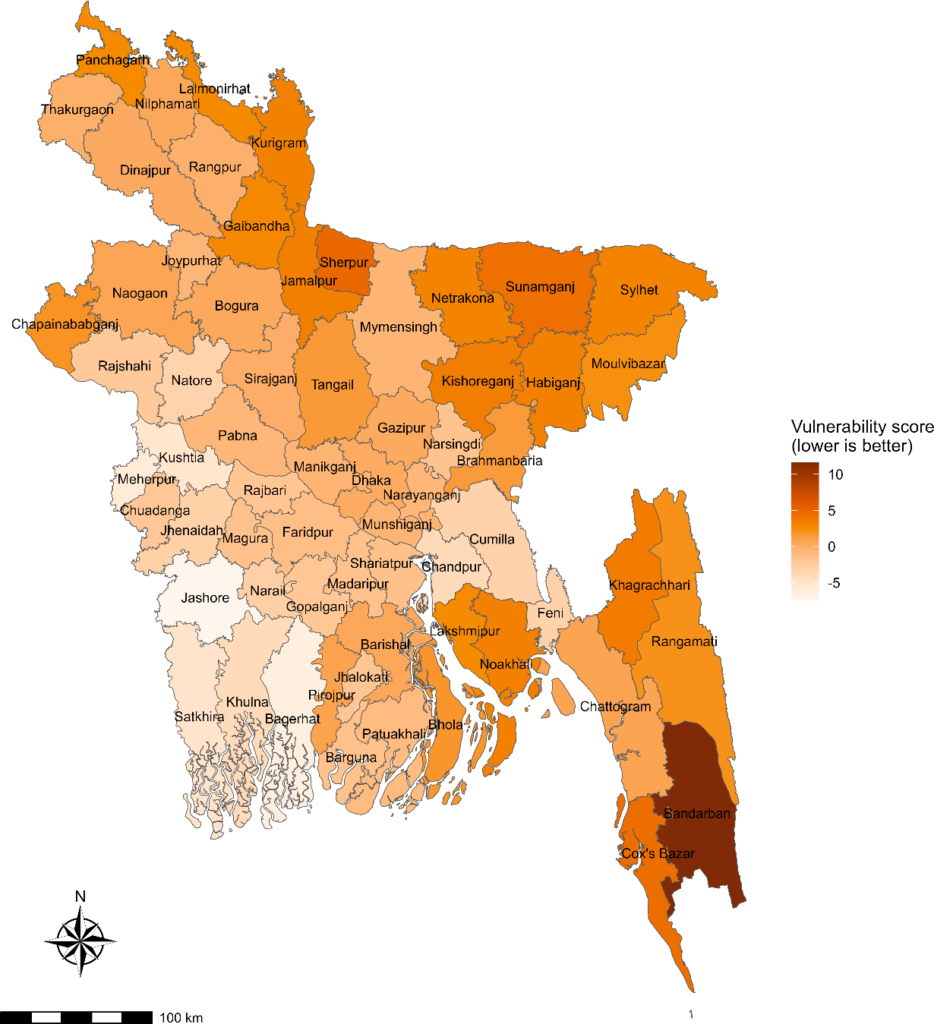In focus: IFPRI’s latest report
Food is more than sustenance. It is a cornerstone of human dignity and the foundation of national progress. In Bangladesh, a country that has achieved remarkable economic growth and poverty reduction over the last several decades, food security remains a persistent challenge. Despite a sharp decline in poverty—from 40% of the population in 2005 to 18.7% in 2022—millions of Bangladeshis still struggle with consistent access to sufficient and nutritious food, particularly in geographically vulnerable regions and among marginalized groups.
The International Food Policy Research Institute (IFPRI) has brought this issue to the forefront with its latest report, Food Security and Nutrition in Bangladesh: Evidence-Based Strategies for Advancement (Ahmed, Bakhtiar, and Mahzab 2024).Drawing on comprehensive district- and division-level data, the report analyzes the current state of food and nutrition security and outlines actionable strategies to address disparities and build a more resilient food system. It provides a critical roadmap for policymakers, agricultural stakeholders, and development partners working to ensure that Bangladesh’s economic success translates into sustainable improvements in food security and nutrition.
Why does this matter now?
Bangladesh’s progress has been bolstered by strong agricultural growth, effective social safety nets, and targeted investments in women’s empowerment. Yet, challenges such as regional inequities, stagnant productivity in key food groups like pulses, and vulnerabilities in global fertilizer markets persist. Addressing these issues is vital not only for improving the well-being of the population but also for safeguarding the country’s long-term development trajectory amidst climate challenges and global economic uncertainties.
By focusing on evidence-based interventions and leveraging lessons from past successes, this report highlights the potential for transformative change. It invites stakeholders to envision a Bangladesh where access to nutritious food is universal, agricultural productivity thrives, and women play an equal role in driving the sector forward.
Key takeaways
The report highlights several critical findings that underscore the challenges and opportunities for improving food security and nutrition in Bangladesh:
Bangladesh has seen significant poverty reduction, driven by strong economic growth and effective social safety net programs.
- Between 2005 and 2022, the proportion of people living below the upper poverty line fell from 40% to 18.7%. Over the same period, those living below the lower poverty line fell from 25.9% to 5.6%.
- This progress has been fueled by robust economic growth, with a substantial contribution from the agricultural sector. Agricultural growth has proven to be three times more effective than growth in non-agricultural sectors in reducing poverty.
- Social safety net programs have played a vital role, with Bangladesh’s expenditure on social security programs rising to $11.8 billion in FY2024, about 17% of the national budget and 2.5% of GDP.
Agricultural growth has been driven by significant increases in yields for major cereal crops, but productivity in other essential food groups, such as pulses, has lagged.
- From fiscal years 1999/00 to 2022/23, rice yields increased from 2.9 MT to 4.0 MT per hectare, and wheat yields increased from 1.1 MT to 3.7 MT per hectare.
- However, yields for pulses have remained relatively stagnant, only increasing from 1.1 MT to 1.4 MT per hectare during the same period. This underscores the need for increased investment in research and development to improve pulse productivity, considering their importance as a source of protein in the Bangladeshi diet.
- To address the limited land resources, Bangladesh should prioritize investment in productivity-enhancing technologies and the adoption of improved crop varieties. Shifting to higher-value agricultural production can also contribute to poverty reduction and overall food security.
Women’s empowerment in agriculture is improving but geographical disparities persist, highlighting the need for targeted interventions.
- The proportion of empowered women in rural Bangladesh rose from 29% in 2011/12 to 61.8% in 2018/19, reflecting positive progress.
- However, there are regional variations in empowerment levels. Higher rates are observed in Rangpur, Dhaka, and Khulna, while Sylhet and Chattogram have lower rates. This suggests the need for interventions that are tailored to the specific needs and challenges faced by women in different regions.
Bangladesh faces challenges related to fertilizer availability and affordability, impacting agricultural productivity and requiring policy attention.
- Bangladesh is heavily reliant on imports for key fertilizers, with imports accounting for 70.9% of urea supply in 2022/23.
- The Russia-Ukraine conflict disrupted global fertilizer markets, leading to price spikes. This vulnerability underscores the need for strategies to increase domestic fertilizer production and diversify import sources.
Geographic variations in food security indicators across Bangladesh’s 64 districts underscore the importance of spatially targeted interventions.
- We used principal component analysis to create vulnerability scores for food availability, access, and utilization, leading to the creation of a district-level food insecurity index that can support policymakers in targeting food vulnerabilities across 64 districts in Bangladesh.
- Overall food insecurity hotspots are Bandarban, Cox’s Bazar, Khagrachhari, Sherpur, and Sunamganj Districts.This approach can allow policymakers to allocate resources more efficiently and effectively address food security challenges at the local level.

In conclusion,
IFPRI’s latest report, titled “Food Security and Nutrition in Bangladesh: Evidence-Based Strategies for Advancement,” underscores the need for a multifaceted approach to achieve lasting food security in Bangladesh. It recommends a range of evidence-based policy interventions, encompassing agricultural finance, mechanization, social safety nets, women’s empowerment, and climate change adaptation. By addressing these critical areas, Bangladesh can build a more resilient and equitable food system that benefits all citizens.
References
Ahmed, Akhter U.; Bakhtiar, M. Mehrab; and Mahzab, Moogdho M. 2024. Food Security and Nutrition in Bangladesh: Evidence-Based Strategies for Advancement. IFPRI Report October 2024. Washington, DC: International Food Policy Research Institute. https://hdl.handle.net/10568/159466



